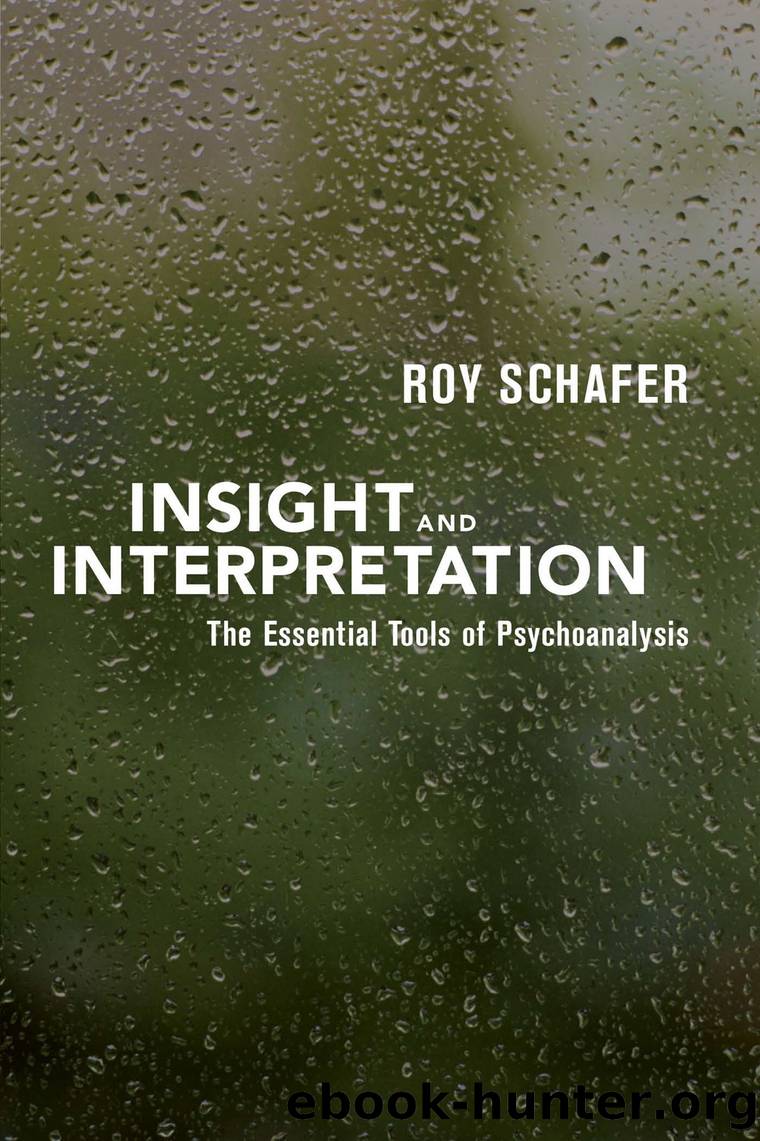Insight and Interpretation by Roy Schafer

Author:Roy Schafer [Schafer, Roy]
Language: eng
Format: epub
Publisher: Other Press
Published: 2020-11-24T00:00:00+00:00
CLINICAL EXAMPLES
First clinical example. Felix presented with a problem of premature ejaculations in his sexual affair with a sexually forward married woman. In the analytic sessions, his manner was charming, intelligent, consistently unruffled. In giving history, he spoke fondly of his mother and criticized his father as distant and competitive. Already, one might think of Freudâs having proposed, in his âContributions to the Psychology of Loveâ (1914), that impotence expresses the effects of unconscious oedipal conflict. In fact, Felixâs analyst, a female supervisee, did soon comment in a way that pointed toward an oedipal interpretation. Soon afterwards, the sexual symptom disappeared. One might be tempted to conclude that the symptomâs disappearance validated the oedipally slanted interpretation. Indeed, in the old days, some analysts might have predicted this result. But what if the analystâs comment was frightening enough to stimulate the flight into health that Freud always considered a possibility? Unconsciously, the analysand might have experienced it as the analystâs âcomingâ too soon. In fact, it was not long before Felix lost interest in the married woman and reverted to the relatively asocial lifestyle with which he had entered analysis. Once again, he seemed indifferent to sex. This sequence is not unfamiliar in clinical practice. Symptoms come and go for many reasons other than insightful working through.
A classical but more cautious Freudian analyst might infer from this clinical sequence of events only that the intervention was ill timed in that the ground had not been prepared for it, as, for example, it might have been had the analyst first brought it slowly into the transference. Then it might have turned out that the analysandâs heterosexual movement had been in the service of his flight from an erotic transference to his female analyst and a bid for her affection by being a âgood boy.â That the change was not sustained might then testify only to the unanalyzed oedipal aggression in the transference along with continuing castration anxiety. All told, we could be contemplating an instance of what long ago Edward Glover (1931) would have subsumed under âthe therapeutic effect of inexact interpretation.â
I have presented this incomplete sketch of an extended line of oedipal thinking not as a correct set of conclusions, but rather as one way of inferring the level on which to interpret. However, the gist of a phallic-oedipal interpretation might have eluded Felix, because he was not amenable to interpretations formulated in a way that is appropriate to a basically objected-related person with an adequate capacity to think symbolically. Another analyst, focused on Felixâs asocial lifestyle, might have reservations about this classical set of inferences and propose instead that Felix was living for the most part on the relatively more primitive paranoid-schizoid level of function. Then, Felix would be considered someone who is not strongly related to already differentiated objects through a reasonably defined self. This analyst would wonder if Felix might be a man afraid to abandon a mistrustful, narcissistic position. He or she might infer that Felix had merely yielded passively, partially, and briefly to the approaches of a seductive woman.
Download
This site does not store any files on its server. We only index and link to content provided by other sites. Please contact the content providers to delete copyright contents if any and email us, we'll remove relevant links or contents immediately.
| Administration & Medicine Economics | Allied Health Professions |
| Basic Sciences | Dentistry |
| History | Medical Informatics |
| Medicine | Nursing |
| Pharmacology | Psychology |
| Research | Veterinary Medicine |
Bioenergetica by Alexander Lowen(1472)
The Child in You by Stefanie Stahl(1249)
No Bad Parts by Richard C. Schwartz(1235)
Noise: A Flaw in Human Judgment by Sunstein Cass R. & Sibony Olivier & Kahneman Daniel(1180)
The Data Detective by Tim Harford(1133)
Chatter by Ethan Kross(1061)
The Science of Rapid Skill Acquisition by Peter Hollins(910)
The Quantum Psychiatrist: From Zero to Zen Using Evidence-Based Solutions Beyond Medication and Therapy by Biswas Dona(872)
Freedom by Sebastian Junger(853)
The Montessori Baby by Simone Davies(848)
Maps of Meaning: The Architecture of Belief by Jordan B. Peterson(741)
The Science of Self-Learning: How to Teach Yourself Anything, Learn More in Less Time, and Direct Your Own Education (Learning how to Learn Book 1) by Peter Hollins(729)
Evolution Gone Wrong: The Curious Reasons Why Our Bodies Work by Alex Bezzerides(702)
Sadomasochism and the BDSM Community in the United States by Stephen K. Stein(688)
Anxiety For Dummies by Charles H. Elliott & Laura L. Smith(663)
Disconnected by thomas Kersting(657)
Why Sex Doesn't Matter by Olivia Fane(653)
Jung - The Key Ideas: Teach Yourself (TY Philosophy) by Ruth Snowden(625)
The Mechanics of Passions: Brain, Behaviour, and Society by Alain Ehrenberg(613)
